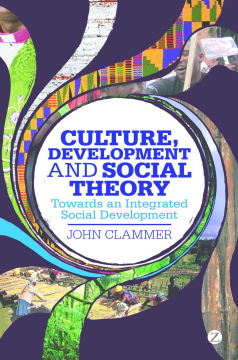
Additional Information
Book Details
Abstract
This important book places culture back at the centre of debates in development studies. It introduces new ways of conceptualizing culture in relation to development by linking development studies to cultural studies, studies of social movements, religion and the notion of 'social suffering'. The author expertly argues that in the current world crises it is necessary to recover a more holistic vision of development that creates a vocabulary linking more technical (and predominantly economic) aspects of development with more humanistic and ecological goals. Any conception of post-capitalist society, he argues, requires cultural, as well as economic and political, dimensions.
John Clammer is currently Visiting Professor of Development Sociology at the United Nations University, Tokyo, and is the author of numerous books.
'In an impressively wide-ranging study of fundamental existential issues, drawing on sources of critical thought from economic and philosophical anthropology, cultural studies and sociology, John Clammer provides a critically engaging analysis of pressing social, economic and environmental concerns which radically reconstitutes our understanding of development and simultaneously demonstrates the progressive political possibilities provided by a profoundly recast cultural turn. This is an important book and deserves to be widely read.'
Barry Smart, University of Portsmouth
'Critically re-engages with culture and nature, and justice and development, towards an imaginative, existential, philosophical anthropology; a powerful, passionate and pellucid text.'
Raymond Apthorpe, SOAS
'John Clammer's marvelous new book invites us to think again about the idea of development, to reject conventional top-down definitions in favour of the creative ideas carried in ordinary life and those social sciences that have remembered the importance of the idea of culture - urgent and timely advice for all those concerned with development in today's globalized world.'
Peter Preston, University of Birmingham
Table of Contents
| Section Title | Page | Action | Price |
|---|---|---|---|
| Cover | Front cover | ||
| About the author | ii | ||
| Title | iii | ||
| Copyright | iv | ||
| Contents | v | ||
| Acknowledgements | vii | ||
| PART I On culture and development | 1 | ||
| 1 Transforming the discourse of development: cultures, suffering and human futures | 3 | ||
| Culture and the structures of development inquiry | 9 | ||
| The trouble with culture | 14 | ||
| Culture, development and social transformation | 18 | ||
| Structure of the book | 26 | ||
| Culture, history and development theory | 28 | ||
| 2 On cultural studies and the place of culture in development | 33 | ||
| Locating culture | 34 | ||
| The meanings of culture | 37 | ||
| Cultural studies and development theory | 44 | ||
| Reasserting culture | 48 | ||
| Beyond path dependency: theoretical and practical implications | 51 | ||
| A closing meditation on ‘spaces of hope’ | 55 | ||
| 3 Aid, culture and context | 58 | ||
| Culture, globalization and aid | 69 | ||
| Aid refigured in the context of culture | 74 | ||
| 4 Liberating development from itself: the politics of indigenous knowledge | 82 | ||
| Critical approaches to indigenous knowledge | 84 | ||
| The problem of knowledge | 92 | ||
| The politics of knowledge | 98 | ||
| Towards a strategic theory of indigenous knowledge | 99 | ||
| What exactly is the paradigm shift? | 103 | ||
| Six theses on indigenous knowledge | 106 | ||
| PART II Expanding the boundaries of development discourse: two illustrations | 113 | ||
| 5 Reframing social economics: economic anthropology, post-development and alternative economics | 115 | ||
| Background to the debate | 118 | ||
| Alternative economic thinking | 121 | ||
| Articulating alternatives | 125 | ||
| Post-capitalism and anthropology | 130 | ||
| Mapping the future | 142 | ||
| 6 Culture and climate justice | 144 | ||
| Culture and climate | 144 | ||
| Culture and core values | 151 | ||
| Culture and justice | 160 | ||
| PART III Development, culture and human existence | 163 | ||
| 7 Narratives of suffering: human existence and medical models in development | 165 | ||
| Suffering and development | 167 | ||
| Narrative, development, empowerment | 172 | ||
| Medical models and development | 176 | ||
| Suffering and methodology in development studies | 184 | ||
| Widening the moral community | 186 | ||
| 8 Towards a sociology of trauma: remembering, forgetting and the negotiation of memories of social violence | 192 | ||
| The memorialization of violence | 194 | ||
| Strategies of containment | 198 | ||
| Reflections on violence | 200 | ||
| The anthropology of memory and the anthropology of suffering | 202 | ||
| War, development, suffering | 204 | ||
| War/development, memory/narrative | 212 | ||
| 9 The aesthetics of development | 220 | ||
| Vision and justice/visual justice; or, why should beauty be the province of only the rich? | 223 | ||
| The education of desire | 227 | ||
| Imagination and the erotics of development | 232 | ||
| The art of sustainability | 236 | ||
| The aesthetics of imperfection | 238 | ||
| 10 Emotions of culture, social movementsand social transformation | 242 | ||
| Culture, emotions and social movements | 244 | ||
| Social movements, development and new knowledge | 248 | ||
| Culture and development revisited | 259 | ||
| References | 263 | ||
| Index | 283 | ||
| About Zed Books | 292 |
